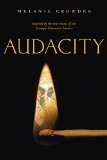Summary | Excerpt | Reviews | Beyond the Book | Read-Alikes | Genres & Themes | Author Bio

This article relates to Audacity
Like many immigrant families in New York at the turn of the 20th century, Clara and her family lived in a tenement very much like the one preserved and recreated at the Tenement Museum in Manhattan's Lower East Side, a National Historic Site run by the National Park Service. This five-story brick building on Orchard Street was built in 1863 and over the next 70 years was home to almost 7,000 working class immigrants from twenty nations.
The museum was the vision of Ruth Abram, a historian and social activist who wanted to create a place that would honor America's immigrants. When she and co-founder Anita Jacobson stumbled upon the tenement in 1988 and saw the sheet-metal ceilings, the turn-of-the-century toilets and aging wooden banisters, they knew they had found the perfect time capsule that could allow visitors to be immersed in the experience of early 20th century tenement life.
 For the next several years, a group of enthusiastic researchers compiled evidence about tenants and tenement life and set about restoring the abandoned dilapidated apartments. The 20 three-room apartments were built four per floor, two in front and two in the rear and were reached by an unlit, ventilated wooden staircase running through the center of the building. The front room, measuring 11' x 12' 6" was the largest. Behind it came the kitchen and one tiny 8'6" square bedroom. Each kitchen had a fireplace, which burned coal or wood. The entire flat, which often contained households of seven or more people, totaled about 325 square feet. There were no toilets and no bath. Privies were located in the rear yard.
For the next several years, a group of enthusiastic researchers compiled evidence about tenants and tenement life and set about restoring the abandoned dilapidated apartments. The 20 three-room apartments were built four per floor, two in front and two in the rear and were reached by an unlit, ventilated wooden staircase running through the center of the building. The front room, measuring 11' x 12' 6" was the largest. Behind it came the kitchen and one tiny 8'6" square bedroom. Each kitchen had a fireplace, which burned coal or wood. The entire flat, which often contained households of seven or more people, totaled about 325 square feet. There were no toilets and no bath. Privies were located in the rear yard.
In 1992, the museum opened one restored apartment where the German-Jewish Gumpertz family had lived in 1878. The museum subsequently restored five more and now offers themed guided tours that give priceless insights into the lives of the tenants. The tours include "Shop Life" where visitors experience the family-run stores that took up the lower level of the building for over a century and hear the stories of turn-of-the-century kosher butchers, a 1930s auctioneer, and 1970s undergarment discounters. Another tour titled "Sweatshop Worker" takes you through the Levine family's garment workshop and the Rogarshevskys' Sabbath table — visitors are given glimpses into how these residents tried to balance work, family and religion at a time of great change. There's also the "Irish Outsiders" tour through the restored quarters of the Irish-Catholic Moore family, which I took on a typically warm summer day wearing sandals and a lightweight cotton sundress and nearly fainted from the heat in the unventilated close quarters. But when I saw the actual dress that Mrs. Moore wore every day — the heavy layers upon layers, the long sleeves and high neck — to carry water up flights of stairs to boil diapers and cook for her family in her small windowless kitchen, I was humbled and stopped complaining.
 The museum also offers living history programs where visitors can meet and converse with actors who take on the personas of family members who once lived in the tenement building. In addition, walking tours of the Lower East Side offer a broader view of the historical neighborhood. The museum also offers a number of tools, including lesson plans and primary resources, for educators.
The museum also offers living history programs where visitors can meet and converse with actors who take on the personas of family members who once lived in the tenement building. In addition, walking tours of the Lower East Side offer a broader view of the historical neighborhood. The museum also offers a number of tools, including lesson plans and primary resources, for educators.
The Tenement Museum continues to grow and expand as it pursues its vision of preserving and interpreting the history of immigration through the personal experiences of the generations of newcomers who settled in and built lives on Manhattan's Lower East Side. Visitors leave the museum with a deeper understanding and appreciation of the invaluable role of immigration in shaping America's ever-changing national identity.
Pictures by Keiko Niwa from The Tenement Museum
Filed under Places, Cultures & Identities
![]() This "beyond the book article" relates to Audacity. It originally ran in January 2015 and has been updated for the
January 2016 paperback edition.
Go to magazine.
This "beyond the book article" relates to Audacity. It originally ran in January 2015 and has been updated for the
January 2016 paperback edition.
Go to magazine.
Your guide toexceptional books
BookBrowse seeks out and recommends the best in contemporary fiction and nonfiction—books that not only engage and entertain but also deepen our understanding of ourselves and the world around us.